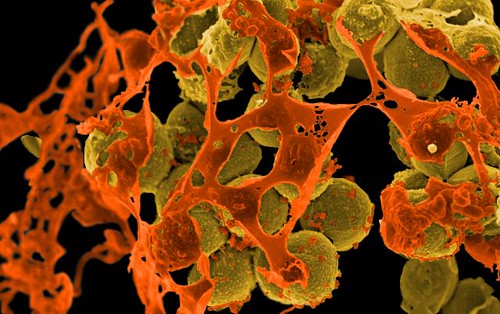Crowdsourcing: Northeastern Ph.D Candidate Turns to Crowdsourcing for Data, Funds
Philip Strandwitz wants you. Really. He also wants all of your friends, and probably your parents and relatives, too. Strandwitz, a Ph.D. candidate for Microbiology in Kim Lewis’s lab, the Antimicrobial Discovery Center, is taking a creative approach to big data that could be a model for the future of science.
First up, his experiment. Strandwitz studies microbiomes — more specifically, the approximately 10 trillion bacteria that live in the human gut. “It works out to be about four to five pounds of bacteria in every human,” Strandwitz explains. “I just fell in love with it!”
With the bacteria living in our gut making up so much of us, there has been a series of research fairly recently exploring how the relationship between us and them works. There have been several papers published showing certain colonies of gut bacteria that flourish within the intestinal tracts of those with autism, as well as links to other diseases such as obesity, certain cancers, and diabetes. Most of these studies have been done in mice, however. While there is massive anecdotal evidence, the human studies are slim.
Enter Strandwitz, whose personal focus is mental health, more specifically, anxiety and depression,
“One in five people will be diagnosed with anxiety in their lifetime, and one in 10 with depression,” explained Strandwitz. “It is a huge problem.” And a problem Strandwitz believes your gut might be behind.
For Strandwitz’s current experiment, he hopes to gather a cohort of 500 students and community members of Northeastern and collect from them both a stool sample and a brief psychiatric profile. Working together with on-campus psychologist Lisa Barrett, he then hopes to break down the various gut bacteria and personality aspects of this cohort and look for correlations.
“We know that microbiomes can affect drugs — either the drugs themselves or prompting the side effects,” said Strandwitz. “There is real potential for Pharma here also — the idea of microbes as therapeutics.”
By gathering a large enough pool of people and seeing if their personalities and emotions have a connection to the bacteria they lug about in their guts all day, Strandwitz hopes to be able to to put a paper together that can then be used a jumping-off point for even larger cohorts and even more bacteria profiled.
This is where the second interesting big data aspect of Strandwitz’s experiment comes in. The issue that Strandwitz faces is that funding is notoriously difficult to come by for new projects. To provide funding, large grant organizations, the primary source for money of this type, want to see results, and to get results, you need to run experiments — experiments that, particularly when dealing with a lot of moving parts such as Strandwitz is, require a fair amount of money on their own. Strandwitz was internet-searching other ways of funding when he stumbled across experiment.com.

Experiement.com describes itself as “a platform for funding projects, conducting research, and sharing results with the public” in an “’open and democratic way to initiate new discoveries.” It is the scientific community’s version of Kickstarter, and is chock-full of scientists just like Strandwitz, from a variety of universities and independent groups, looking for that nudge that could bring them to a big discovery.
A self-proclaimed fan of crowdsourcing, Strandwitz said he thought the website seemed like a great funding opportunity for him. When hearing about his project, a team from experiement.com came to Boston to film him in his lab for his experiment’s online profile.
There are many benefits to experiment.com, as Strandwitz explains it. After the fundraising closes after 60 days, the money is available within about a week, and the scientists get about 93 percent of it.
In fact, other Northeastern scientists have already come to experiment.com to get their experiements off the ground, gaining the funds to explore topics such as neglected tropical diseases and striped bass.
Strandwitz’s financial goal of $50,000 is twice as high as the highest previous Northeastern request, however. “Most of the time, the goals hover around about $5,000,” Strandwitz admitted. But he is nothing if not passionate.
“I could talk about microbes all day,” he jokes. “People don’t want to go on long car rides with me any more because it is all I talk about.”
To Strandwitz, the possibilities for this research are basically limitless- but with a caveat. He becomes serious. “The fact of the matter is, that yes, it is exciting, and, yes, it is an opportunity, but it needs proper testing.”
In a way that has the potential to model how more science will be conducted in the future, he has released his claim to this testing — both the data and the funds lying in the hands, and the guts, of the people around him.
For more information on Phil Strandwitz studies, and to donate to his campaign, visit https://experiment.com/projects/are-our-bacteria-making-us-depressed-or-anxious.
